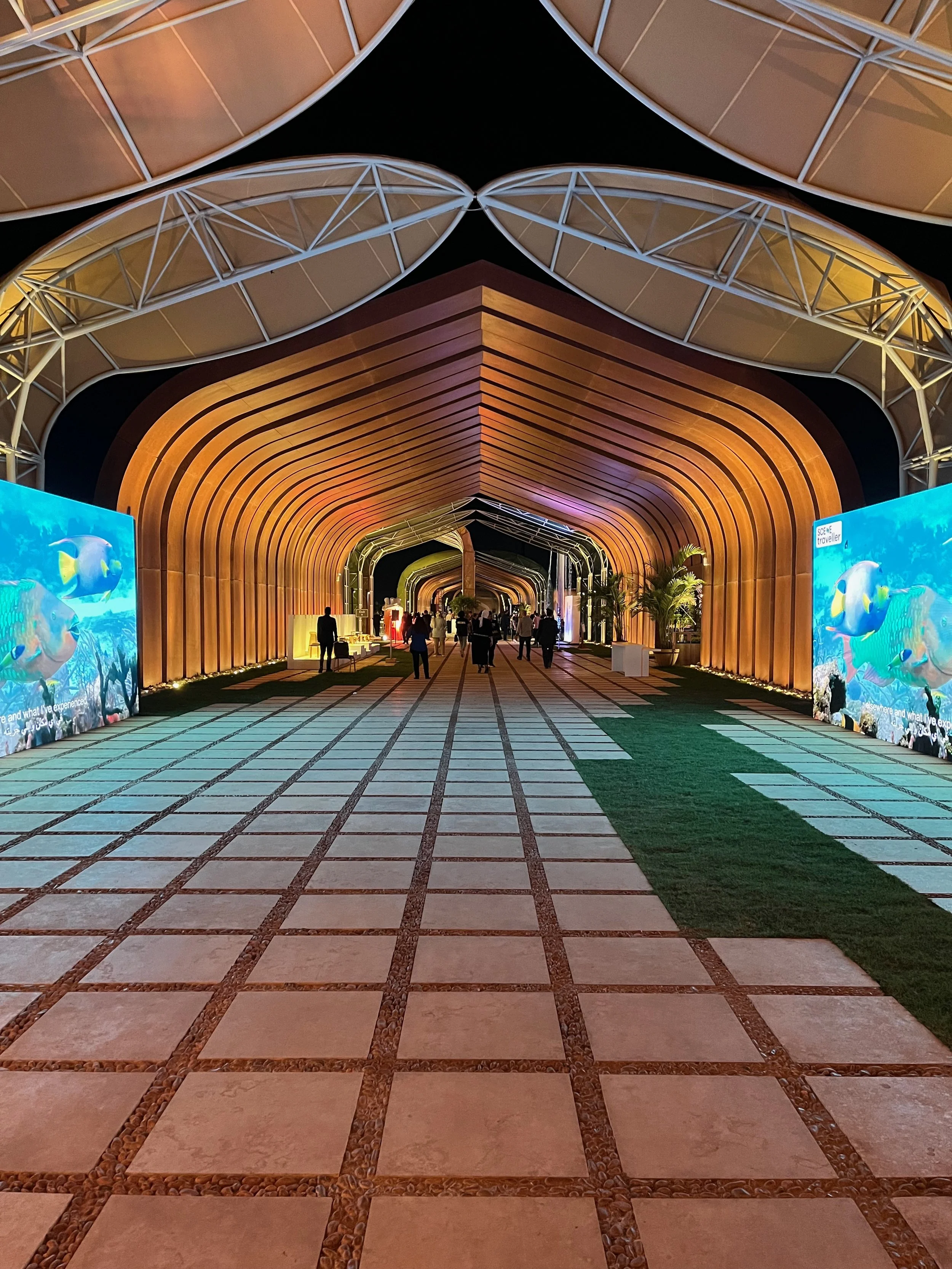COP27: Reflections on the Conference & Insights for the Future
Last month, the green city of Sharm El Sheikh hosted the 27th Conference of Parties of the United Nations Framework Convention on Climate Change (UNFCCC)—COP27. Being surrounded by the fabulousness of this city was in itself a great motivation to continue striving to save this beauty for generations to come. The RISE team was proud to be there as part of the Environmental Initiatives booth in the Green Zone and to showcase our efforts on mapping green innovations in Egypt.
Gathering our reflections after the conference ended, I sat down with Mohamed Kamal, Director of Greenish and COP27 Blue Zone Observer, to hear his insights on the conference, its outcomes and the path forward for climate action.
COP27 Green Zone, Nov. 2022 - Sharm El Sheikh, Egypt
Omar Serageldin: Can you share with us your overall reflections on the conference?
Mohamed Kamal: COP27 was by no doubt a very big event. Compared to previous COPs, this year’s conference had a bigger Blue Zone with a lot of diverse pavilions and a historic Green Zone that included so many private sector and civil society organizations.
In the Blue Zone, you could feel the divide between two main groups; a group that was more interested in spending time in side talks and events happening in the different pavilions, and another group that was more engaged with the negotiations from start to finish—a divide that, in my point of view, stirred up an important conversation on how to maximize interactions between both groups and ensure the cohesion of their visions. As for the Green Zone, it was a much calmer space where so many initiatives showcased their work and connected together.
Although there was a sense of disconnect between both zones, I think that they both achieved their intended objectives. In the Blue Zone, the pavilions showcased the excellence of countries, organizations and initiatives, while the negotiations proceeded in the targeted directions. And in the Green Zone, there was a common place for people to engage and get to explore civil society initiatives.
Environmental Initiatives Booth, COP27 Green Zone, Nov. 2022 - Sharm El Sheikh, Egypt
OS: Did you feel that there was a unified narrative that civil society was advocating for this year? And to what extent do you think it was effective?
MK: I think there were multiple narratives; however, the narrative that dominated the civic engagement space at COP27 was ‘climate justice.’ This narrative dictated a lot of discussions, and because of that, ‘loss and damage’ became a major focus. It was clear how civil society groups from different countries around the world were determined to advocate for this as they have not yet seen significant advancements being done on mitigation or adaptation while lands are being lost and communities are being displaced because of climate change.
Access to information and youth empowerment were also among the major issues that different civil society groups focused on. In light of this, one of the key achievements of the Egyptian Presidency of the Conference was the establishment of the Youth Pavilion and the acknowledgement of the youth statement in high-level negotiations.
That being said, I don’t think that there was enough space for civil society engagement into key discussions during the conference. I think this was mainly because of the UNFCCC’s current approach to have more meetings and negotiations behind closed doors which limits the ability of civil society organizations to be present and interact with delegations. Nonetheless, I believe that key messages from civil society organizations were heard by negotiators. After all, the establishment of the Loss and Damage Fund was a huge victory for the international civil society that was pushing for this milestone for years.
OS: Speaking of the Loss and Damage Fund, I am curious to hear your insights on this outcome.
MK: The Loss and Damage Fund is a significant outcome. It is a cause of celebration, especially for developing countries. This has been on the negotiations table for years, and agreeing on establishing the fund and the committee that will oversee its transition from establishment to operationalization is a major milestone—one that I believe was possible because of the effective bilateral relations that Egypt has with countries around the world. I think this will encourage the emergence of more promising nationally-determined contributions (NDCs) toward green and sustainable transition now that countries know that they will be held accountable for their actions.
COP27 Green Zone, Nov. 2022 - Sharm El Sheikh, Egypt
OS: Thinking of the road ahead, what learnings from this year’s conference do you think could be leveraged for future COPs and the fight against climate change in general?
MK: While COPs set an important stage and a checkpoint for countries to agree on specific outcomes and be held accountable for their contributions, we can see now how the process is slow compared to the adversities of climate change and how we need to move at a much faster pace to advance mitigation and adaptation efforts. I think the entire process needs to be revisited to identify needed reforms that overcome distractions and lead to more promising agreements and quicker actions. And I think the more regional and international partnerships on both the governmental and civil society levels, the more effective outcomes we can achieve; COP27 was a clear proof that when we all come together, we have a stronger impact and are able to do more.
On a civil society level, and perhaps a personal level, I believe that Action for Climate Empowerment (ACE) as a framework that enables communities to start adapting to climate change and shifting away from energy sources that damage our planet is an important aspect to be focused on. It has six fundamental pillars of change that need much attention in the coming years: education; public awareness; training; public participation; public access to information; and international cooperation.
Interview by Omar Serageldin; Manager, LEEP for Collaborative Impact




